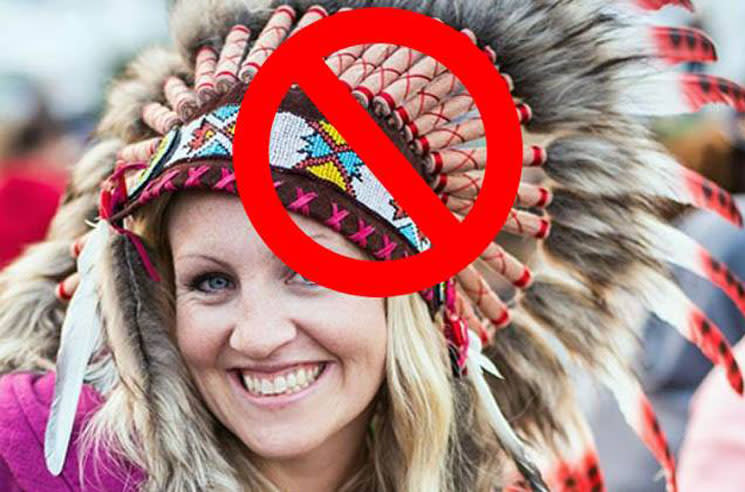Earlier this week, Montreal music festival Osheaga took a stance against culturally appropriative fashion and announced that First Nations-style headdresses had been added to their list of banned items. Organizers warned that any of the traditional headpieces to arrive on site would be confiscated.
Fellow Montreal festivals ÎleSoniq and Heavy Montreal followed suit, and now the culturally sensitive sentiment has made its way west, with the Edmonton Folk Music Festival also adopting the ban.
The festival released a statement via Facebook, which reads:
At this time of greater awareness, the Edmonton Folk Music Festival would like to ask our patrons to respect First Nations cultures and to not wear any type of First Nations headdresses during the festival. Such headdresses have a sacred, cultural meaning and we ask that you respect and honour that by not using them as a fashion accessory.
These items will be confiscated by festival security.
The festival's producer Terry Wickham warned that ignorance was not an excuse, and anyone arriving on site with the banned items will have the option of taking it off or leaving the event with a refund.
"You can Google it and I've done that, I've read about it," he said [via Global News]. "I am following up on the ban from Osheaga."
"When I read about it it's actually — it's an honour," he continued. "You earn the right to wear this in indigenous communities. It's mostly for elders, sometimes for ceremonies, but it's not something you wear as a fashion accessory."
Following years of criticism towards festivalgoers wearing the traditional garments as fashion accessories, the issue was forced into the spotlight this week after a woman at last weekend's Winnipeg Folk Festival spurred a Twitter backlash for wearing a headdress and face paint to the event.
A spokesperson for the Winnipeg Folk Festival released a statement to CBC, explaining that in future years the event will ask patrons to not wear headdresses. The full statement reads:
The Winnipeg Folk Festival is a place of respect – for each other and each other's culture and we celebrate inclusiveness and diversity. We do not condone cultural appropriation and, for the most part, our patrons are attuned to what is culturally appropriate and what is not. We have been in conversation with members of our aboriginal community and see this isolated incident of a woman wearing a headdress as an opportunity for education and cultural sharing. Given the festival is now over for the year we are taking time for dialogue with our Aboriginal Advisory Committee to discuss this issue and our next steps, however we will certainly be asking patrons to not wear headdresses.
The 2015 edition of Osheaga runs from July 31 to August 2, with the Edmonton Folk Music Festival to follow from August 6 to 9.
Fellow Montreal festivals ÎleSoniq and Heavy Montreal followed suit, and now the culturally sensitive sentiment has made its way west, with the Edmonton Folk Music Festival also adopting the ban.
The festival released a statement via Facebook, which reads:
At this time of greater awareness, the Edmonton Folk Music Festival would like to ask our patrons to respect First Nations cultures and to not wear any type of First Nations headdresses during the festival. Such headdresses have a sacred, cultural meaning and we ask that you respect and honour that by not using them as a fashion accessory.
These items will be confiscated by festival security.
The festival's producer Terry Wickham warned that ignorance was not an excuse, and anyone arriving on site with the banned items will have the option of taking it off or leaving the event with a refund.
"You can Google it and I've done that, I've read about it," he said [via Global News]. "I am following up on the ban from Osheaga."
"When I read about it it's actually — it's an honour," he continued. "You earn the right to wear this in indigenous communities. It's mostly for elders, sometimes for ceremonies, but it's not something you wear as a fashion accessory."
Following years of criticism towards festivalgoers wearing the traditional garments as fashion accessories, the issue was forced into the spotlight this week after a woman at last weekend's Winnipeg Folk Festival spurred a Twitter backlash for wearing a headdress and face paint to the event.
A spokesperson for the Winnipeg Folk Festival released a statement to CBC, explaining that in future years the event will ask patrons to not wear headdresses. The full statement reads:
The Winnipeg Folk Festival is a place of respect – for each other and each other's culture and we celebrate inclusiveness and diversity. We do not condone cultural appropriation and, for the most part, our patrons are attuned to what is culturally appropriate and what is not. We have been in conversation with members of our aboriginal community and see this isolated incident of a woman wearing a headdress as an opportunity for education and cultural sharing. Given the festival is now over for the year we are taking time for dialogue with our Aboriginal Advisory Committee to discuss this issue and our next steps, however we will certainly be asking patrons to not wear headdresses.
The 2015 edition of Osheaga runs from July 31 to August 2, with the Edmonton Folk Music Festival to follow from August 6 to 9.
